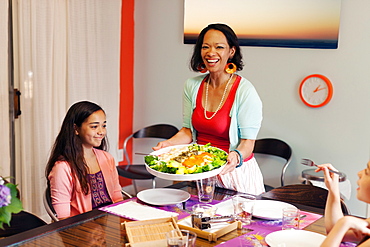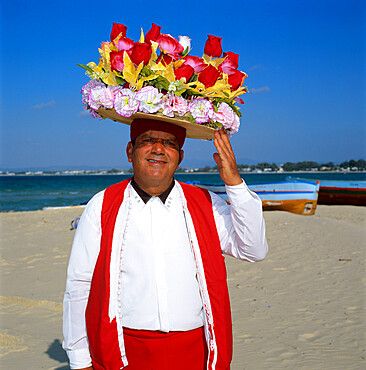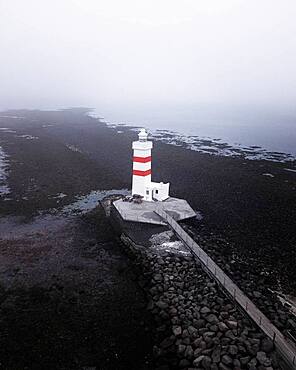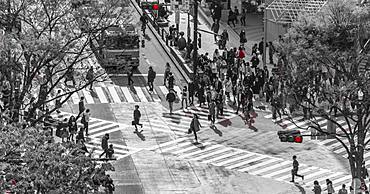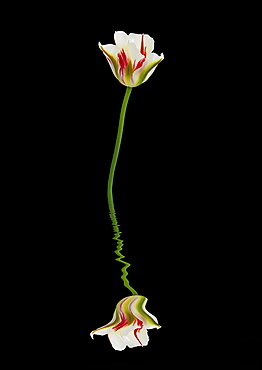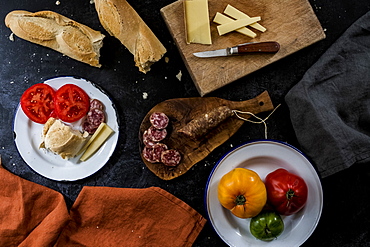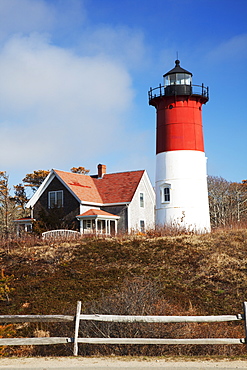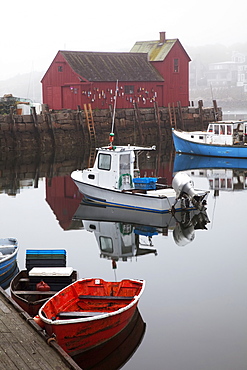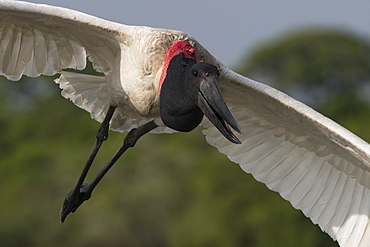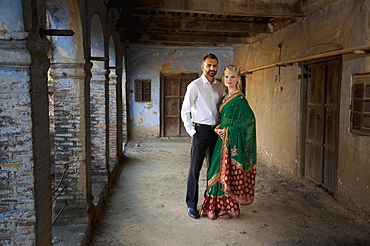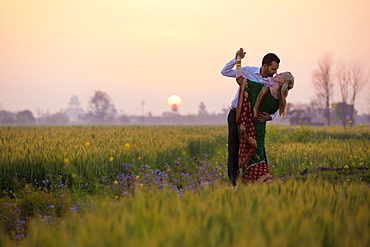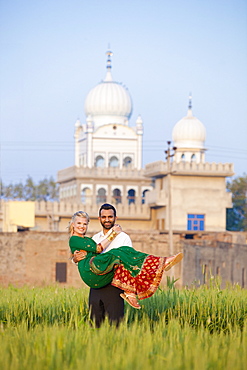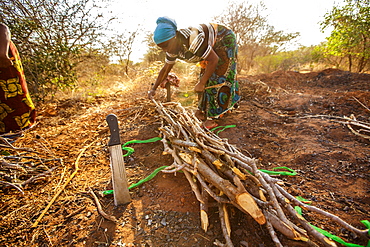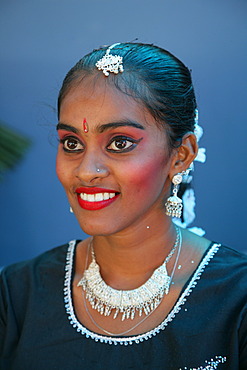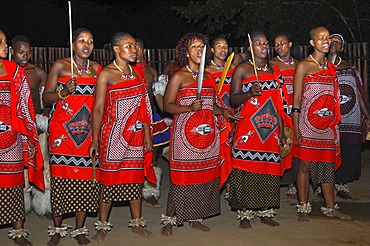Recent searches
Loading...
759-12511 - Black and white Nudibranch, Jorunna funebris, Sanganeb, Red Sea, Sudan
832-399362 - Black and white easter eggs with hearts and stripes next to bunny figure on pink background
832-398534 - Top view traditional japanese sushi with copy space
1350-6678 - Strawberry Poison Frog (Dendrobates pumilio), adult, Bastimentos National Park, Bocas del Toro, Panama. The strawberry poison frog or strawberry poison-dart frog (Oophaga pumilio or Dendrobates pumilio) is a species of small amphibian poison dart frog found in Central America. It is common throughout its range, which extends from eastern central Nicaragua through Costa Rica and northwestern Panama. The species is often found in humid lowlands and premontane forest, but large populations are also found in disturbed areas such as plantations. The strawberry poison frog is perhaps most famous for its widespread variation in coloration, comprising approximately 15���30 color morphs, most of which are presumed to be true-breeding. O. pumilio, while not the most poisonous of the dendrobatids, is the most toxic member of its genus. The species is most diverse in Panama with varieties in vivid shades of all red, orange, blue, yellow or green, green and yellow, white with red, orange or black and spotted varieties. The most colorful mix is found in Isla Bastimentos Marine National Park though not all in one place. Colors vary by location. A beach on the north side of the island is named after the species. Two of Southern Explorations' Panama tours visit red frog habitat. Both the eight-day Panama Adventure trip and eleven-day Panama Highlights trip spend time in Isla Bastimentos Marine National Park and the former also goes to Red Frog Beach.
The red frog is not as poisonous as some of its cousins and is not a threat to humans. It subsists on a diet of ants that dine on poisonous plants, providing the red frog its protective skin toxin. Males attract females with a loud quick chirp. To hear the distinctive sound before you depart on your Panama tours, go to the University of Michigan Museum's biodiversity website (www.animaldiversity.ummz.umich.edu.) After birth, the tadpoles climb aboard the mother who deposits them in different protected areas where she retu
1178-40954 - Contemporary Dining Table with Place Settings and Chopsticks
1116-51142 - Inspirational sign at a Baptist Church during the Covid-19 World Pandemic; Edmonton, Alberta, Canada
832-393701 - Colony of white-spotted diadem Black Longspine Urchin sp (Diadema setosum) on seagrass meadow, Red Sea, Aqaba, Kingdom of Jordan
1116-50355 - Secretary bird (Sagittarius serpentarius) stands holding snake in beak, Grumeti Serengeti Tented Camp, Serengeti National Park; Tanzania
1178-31526 - Woman serving gnocchi and broccoli dish
846-98 - Doorway to Turkish baths in the Medina, Hammamet, Cap Bon, Tunisia, North Africa, Africa
846-105 - Flower seller on the beach, Hammamet, Cap Bon, Tunisia, North Africa, Africa
846-281 - Statue of Johann Strauss, Stadtpark, Vienna, Austria, Europe
832-389761 - Black and white peppercorns in shell, pink berries, Germany, Europe
832-388951 - Aerial view, red and white lighthouse Garour Old Lighthouse, black lava beach, Iceland, Europe
1112-5427 - An adult Tanzanian red-billed hornbill (Tockus ruahae), Tarangire National Park, Tanzania, East Africa, Africa
1112-5426 - An adult Tanzanian red-billed hornbill (Tockus ruahae), Tarangire National Park, Tanzania, East Africa, Africa
252-11326 - Matsumoto-jo (Matsumoto Castle), three-turreted donjon built in 1595 in contrasting black and white, surrounded by a moat with access across ornate red bridges, Matsumoto, Nagano Prefecture, Central Honshu (Chubu), Japan, Asia
832-385585 - Shibuya crossing, crowds at intersection, many people cross zebra crossing, red traffic light, black and white, Shibuya, Udagawacho, Tokyo, Japan, Asia
832-385586 - Single person in red, Shibuya crossing, crowds at intersection, many people cross zebra crossing, black and white, Shibuya, Udagawacho, Tokyo, Japan, Asia
1116-47872 - Black-necked stilt (Himantopus mexicanus) with reflection in water, Bences Hide, Pusztaszer, Hungary
1116-47488 - Secretary bird (Sagittarius serpentarius) walking across grass facing left, Serengeti National Park, Tanzania
1116-48131 - Red, green and white tulip reflected in water on a black background
1174-8149 - A giant kingfisher, Megaceryle maxima, takes off into flight from a bush, wings spread, Londolozi Game Reserve, Sabi Sands, South Africa
746-89418 - Blurred traffic under Tower Bridge, London.
1178-28389 - Woman holding cat in snow, Mount Horeb, Wisconsin, USA
1174-7812 - High angle close up of a selection of cheeses, tomatoes, salami and French baguette on white enamel plates on black background, United Kingdom
1178-27130 - Woman holding red umbrella by Schloss Pfaueninsel in Potsdam, Germany
1178-27129 - Woman holding red umbrella by Schloss Pfaueninsel in Potsdam, Germany
1116-43507 - On And Off Switch, Boston, Massachusetts, United States Of America
1116-43506 - On And Off Switch, Boston, Massachusetts, United States Of America
1116-43177 - Nauset Lighthouse, Cape Cod, Eastham, Massachusetts, United States Of America
1116-43236 - New England, Massachusetts, Close Up Of Small Boats In The Rockport Harbor, Red Building In Background.
741-5729 - A jabiru (Jabiru mycteria) in flight, Mato Grosso, Brazil, South America
741-5730 - Jabiru (Jabiru mycteria), Pantanal, Mato Grosso, Brazil, South America
1116-42290 - A Family Making Snow Angels In Wintertime, Talkeetna, Alaska, United States Of America
1116-42660 - Street Sign, Liwa Oasis, Abu Dhabi, United Arab Emirates
1116-42289 - A Young Girl With Three Adults Playing In The Snow, Talkeetna, Alaska, United States Of America
1116-42291 - Young Girl Making A Snow Angel In Wintertime, Talkeetna, Alaska, United States Of America
1116-42133 - Totem Pole Painted In Colour, Vancouver, British Columbia, Canada
1116-41986 - White japanese paper lanterns hanging in a street, Kyoto japan
1116-42015 - Portrait Of A Mixed Race Couple Her Wearing A Sari, Ludhiana, Punjab, India
1116-42007 - Portrait Of A Mixed Race Couple Her Wearing A Sari In A Field At Sunset, Ludhiana, Punjab, India
1116-42008 - Portrait Of A Mixed Race Couple Her Wearing A Sari With A Temple In The Background, Ludhiana, Punjab, India
832-379473 - Black-backed Jackal (Canis mesomelas), at the carcass of a Cape Buffalo (Syncerus caffer caffer), in the background some White-backed Vultures (Gyps africanus), Savuti, Chobe National Park, Botswana, Africa
1167-1912 - Atlantic puffin (Fratercula arctica), Sumburgh Head, South Mainland, Shetland Islands, Scotland, United Kingdom, Europe
846-2872 - Black and white cat asleep on red chair, Kastro, Sifnos, Cyclades, Aegean Sea, Greek Islands, Greece, Europe
857-94728 - Zainabu Ramadhani, 19, (yellow and red patterned skirt) her mother Fatma Mziray, age 38, (blue head dress) and Fatmaâs sister-in-law Zaitun Hamad, 18, (orange wrap and white top) walk home after gathering firewood near Fatmaâs home in Mforo. Mforo is near Moshi, Tanzania. Fatma Mziray is a Solar Sister entrepreneur who sells both clean cookstoves and solar lanterns. Fatma heard about the cookstoves from a Solar Sister development associate and decided to try one out. The smoke from cooking on her traditional wood stove using firewood was causing her to have a lot of heath problems, her lungs congested her eyes stinging and her doctor told her that she had to stop cooking that way. Some days she felt so bad she couldn't go in to cook. Fatma said, âCooking for a family, preparing breakfast, lunch and dinner I used to gather a large load of wood every day to use. Now with the new cook stove the same load of wood can last up to three weeks of cooking. âWith the extra time I can develop my business. I also have more time for the family. I can monitor my childrenâs studies. All of this makes for a happier family and a better relationship with my husband. Since using the clean cookstove no one has been sick or gone to the hospital due to flu.â Fatma sees herself helping her community because she no longer sees the people that she has sold cookstoves have red eyes, coughing or sick like they used to be. She has been able to help with the school fees for her children, purchase items for the home and a cow. âWhat makes me wake up early every morning and take my cookstoves and go to my business is to be able to take my family to school as well as to get food and other family needs.â
860-285843 - Great Spotted Woodpecker on a branch, Finland
1178-18255 - Portrait of young woman walking in surf, carrying surfboard, Jupiter, Florida
1178-6779 - Close up of Gentoo Penguin with young, Antarctica, Antarctic Peninsula
832-375289 - Red painted door with two eyes watching Durbar Square Kathmandu Nepal
832-369599 - Portrait of a girl of Indian ethnicity at a Hindu Festival in Georgetown, Guyana, South America
832-369415 - Women dance troupe in traditional dress at an evening event, Traditional Cultural centre Mantenga, Ezulwini Valley, Swaziland, Africa
641-13056 - Rothenburg ob der Tauber, Romantic Road, Franconia, Bavaria, Germany, Europe
1167-368 - Rockhopper penguin (Eudyptes chrysocome) courtship behaviour, Rockhopper Point, Sea Lion Island, Falkland Islands, South America
1167-363 - Rockhopper penguins (Eudyptes chrysocome) squabble, Rockhopper Point, Sea Lion Island, Falkland Islands, South America
764-4432 - Red-Backed Shrike (Lanius collurio), Kruger National Park, South Africa, Africa
1161-170 - Young Masai recently cirumsised wears white make-up markings and black robes until in a few weeks he adopts the full red colourful robes of a Masai Warrior
764-3971 - Red-billed oxpecker (Buphagus erythrorhynchus) on a zebra, Imfolozi Game Reserve, South Africa, Africa
764-3934 - Red fox (Vulpes vulpes) in the snow, Grand Teton National Park, Wyoming, United States of America, North America
1160-175 - Man in traditional costume (Federahannes), Narrensprung, traditional carnival, Rottweiler Fasnet, Rottweil, Black Forest, Baden Wurttemberg, Germany, Europe
816-4398 - Cruise ship behind a Penguin colony, Neko Habour, Antarctica, Polar Regions
846-1441 - Buddha tiles on walls of Kek Lok Si Temple, Crane Hill, Georgetown, Pulau Penang, Malaysia, Southeast Asia, Asia
846-1440 - Kek Lok Si Temple, Crane Hill, Georgetown, Pulau Penang, Malaysia, Southeast Asia, Asia
846-1439 - Ban Po pagoda, Kek Lok Si Temple, Crane Hill, Georgetown, Pulau Penang, Malaysia, Southeast Asia, Asia
846-1437 - Penang Peranakan Mansion, recreation of a typical 19th century Baba home, Georgetown, Pulau Penang, Malaysia, Southeast Asia, Asia
10-117 - Red panda, Cotswold Wildlife Park, Costswolds, Gloucestershire, England, United Kingdom, Europe
1109-616 - Dancers doing the traditional Moreska sword dance, in Korcula, Dalmatian Coast, Croatia, Europe
1109-613 - Dancers doing the traditional Moreska sword dance, in Korcula, Dalmatian Coast, Croatia, Europe
1109-615 - Dancers doing the traditional Moreska sword dance, in Korcula, Dalmatian Coast, Croatia, Europe
1109-614 - Korcula Island, dancers doing the traditional Moreska sword dance, Dalmatian Coast, Croatia, Europe
1113-90265 - Red and white grapes, view from below, near Freiburg im Breisgau, Black Forest, Baden-Wurttemberg, Germany
1113-61368 - Kuranda dance group from Queensland, Aborigine, Body painting, Laura Dance Festival, Cape York Peninsula, Queensland, Australia
1113-63793 - Easter procession on Good Friday, citadel of Bonifacio, Bonifacio, Corsica, France
1113-61371 - Boy with red Headband, Aborigine, Body painting, Laura Dance Festival, Cape York Peninsula, Queensland, Australia
1113-61073 - Woman wearing traditinal clothes, Maori Arts Festival, Rotorua, North Island, New Zealand
1113-44488 - Zapata Ranch is a working ranch where tourists can stay and work, Alamosa, Alamosa County, Colorado, USA, North America, America
1113-44459 - Natalia's 1912 restaurant, Silverton, Colorado, USA, North America, America
1113-32580 - Half-timbered houses and town hall at the market place in the town of Schiltach, Summer, Valley Kinzigtal, Southern Part of Black Forest, Black Forest, Baden-Wuerttemberg, Germany, Europe
1116-22884 - West coast First Nation carvings and designs, Fort Rupert, Vancouver Island, British Columbia
857-30502 - Noel Jones canyoneering in "The Black Hole" of White Canyon, Cedar Mesa, Utah
1103-134 - Phyllidiopsis pipeki nudibranch, Sulawesi, Indonesia, Southeast Asia, Asia
846-1176 - View to the Lighthouse with fishermen, Kovalam, Kerala, India, Asia
846-1172 - View to the Lighthouse with fishermen, Kovalam, Kerala, India, Asia
1190-117 - Mute Swan, Hoeckerschwan, Cygnus olor, breeding, Switzerland
1190-121 - Mute Swan, Hoeckerschwan, Cygnus olor, breeding, Switzerland
1190-118 - Mute Swan, Hoeckerschwan, Cygnus olor, breeding, Switzerland
1190-122 - Mute Swan, Hoeckerschwan, Cygnus olor, breeding, Switzerland
1190-123 - Mute Swan, Hoeckerschwan, Cygnus olor, Switzerland
1190-120 - Mute Swan, Hoeckerschwan, Cygnus olor, breeding, Switzerland
1190-119 - Mute Swan, Hoeckerschwan, Cygnus olor, breeding, Switzerland















